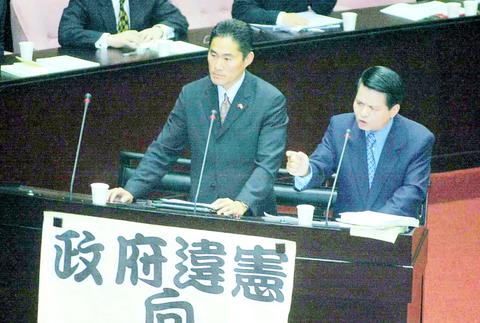Premier Yu Shyi-kun's English skills were tested to the limit yesterday at the legislature when TSU lawmaker John Wang (王政中) quizzed him in English during an interpellation session.
"I heard from abroad that MOFA [Ministry of Foreign Affairs] is arranging a meeting between the first lady and the first lady of the US, Laura Bush. Is this a correct assumption?" Wang asked in fluent English.
The legislator, representing overseas Chinese communities, was referring to the recent itinerary of first lady Wu Shu-chen (吳淑珍), who is visiting Washington.

PHOTO: CHIANG YING-YING, TAIPEI TIMES
Failing to understand the question, the premier looked perplexed.
Minister of Foreign Affairs Eugene Chien (簡又新), who stood next to Yu, came to his rescue and gave Yu a translation.
Yu then replied in Mandarin that he had had a bumpy educational process and that his skill in languages was not as good as most people's. "[Therefore] my English is very bad, I only speak a little English," Yu added, in English.
"This is quite OK because I think it is important that you try as a leader of the nation. I think it is a good start," Wang said.
Wang, who grew up in the US and has a very limited Mandarin ability, said the reason he questioned the premier in English was to remind people to improve their command of English as part of Taiwan's globalization drive.
"Leaders such as Yu or President Chen Shui-bian (陳水扁) should take the lead," he said.
The lawmaker is the son of Kenjohn Wang (王桂榮), chairman of the Taiwanese-American Foundation, a pro-independence group in the US.

Taiwan is stepping up plans to create self-sufficient supply chains for combat drones and increase foreign orders from the US to counter China’s numerical superiority, a defense official said on Saturday. Commenting on condition of anonymity, the official said the nation’s armed forces are in agreement with US Admiral Samuel Paparo’s assessment that Taiwan’s military must be prepared to turn the nation’s waters into a “hellscape” for the Chinese People’s Liberation Army (PLA). Paparo, the commander of the US Indo-Pacific Command, reiterated the concept during a Congressional hearing in Washington on Wednesday. He first coined the term in a security conference last

Prosecutors today declined to say who was questioned regarding alleged forgery on petitions to recall Democratic Progressive Party (DPP) legislators, after Chinese-language media earlier reported that members of the Chinese Nationalist Party (KMT) Youth League were brought in for questioning. The Ministry of Justice Investigation Bureau confirmed that two people had been questioned, but did not disclose any further information about the ongoing investigation. KMT Youth League members Lee Hsiao-liang (李孝亮) and Liu Szu-yin (劉思吟) — who are leading the effort to recall DPP caucus chief executive Rosalia Wu (吳思瑤) and Legislator Wu Pei-yi (吳沛憶) — both posted on Facebook saying: “I

Sung Chien-liang (宋建樑), who led efforts to recall Democratic Progressive Party (DPP) Legislator Lee Kun-cheng (李坤城), was released on bail of NT$80,000 today amid outcry over his decision to wear a Nazi armband to questioning the night before. Sung arrived at the New Taipei District Prosecutors’ Office for questioning in a recall petition forgery case last night wearing a red armband bearing a swastika, carrying a copy of Adolf Hitler’s Mein Kampf and giving a Nazi salute. Sung left the building at 1:15am without the armband and covering the book with his coat. Lee said today that this is a serious

Firefighters are working to put out a fire on Taipei’s Yangmingshan (陽明山) reported earlier this morning. The cause of the fire is still under investigation. The Taipei Fire Department said it received a report of a fire at Xiaoyoukeng (小油坑) at 11:17am, dispatching four command vehicles, 16 firetrucks, one ambulance and 72 personnel. The fire is still burning on about 250m² of land, according to initial estimates, as eyewitnesses reported seeing smoke rising from the mountain. The Yangmingshan National Park Headquarters on Facebook said the Qixingshan (七星山) hiking trail starting from Xiaoyoukeng and the Xiaoyoukeng parking lot are closed as firefighters work to put